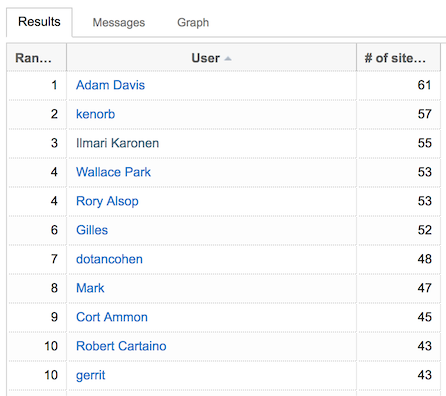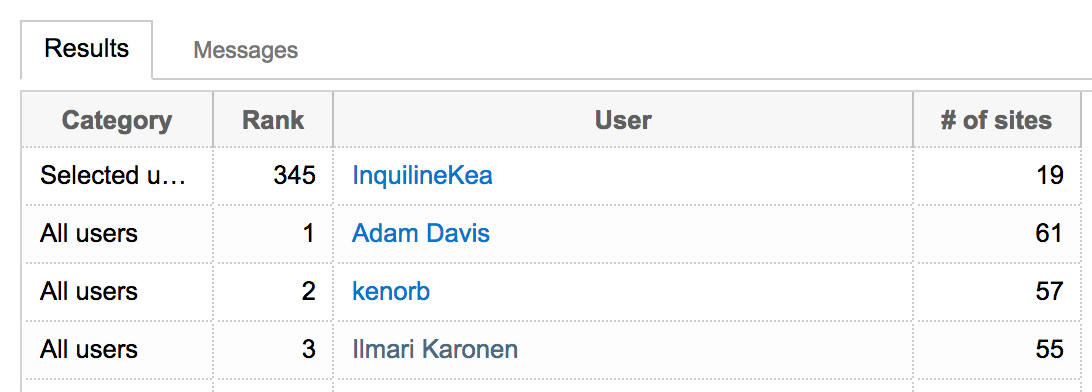Which users have the most accounts with over 200 reputation across the Stack Exchange networks?
Is it common or is it rare? I don't necessarily need a "best answer" - any answer should help (as I tend to be someone who distributes my activity across multiple networks as well).
3 Answers
The "association id" or AccountId is now available, so I produced the requested query here.
Note that I explicitly skip all Metas except this one, so that the query results should be the same as the number of sites with more than 200 rep that you see in a user's accounts tab.
-
-
IIRC there's a way of doing this that does scale (instead of having to mention each site individually) Commented Feb 16, 2014 at 18:38
-
@Manishearth Because they're separate databases you need to do something that refers to them individually, but you may be able to automate the generation and then use a dynamic query. Commented Feb 16, 2014 at 23:04
-
@MarkHurd data.stackexchange.com/stackoverflow/query/40465/… Commented Feb 16, 2014 at 23:09
-
@Manishearth Updated that: data.stackexchange.com/stackoverflow/query/168161/… Commented Feb 16, 2014 at 23:27
-
@EnergyNumbers I include all data included in the SEDE (except Metas for this query). See Any plans for a Data Explorer for Area 51?. Commented Feb 16, 2014 at 23:32
While it is possible to do cross-site queries using the Data Explorer, I don't believe it is currently possible to use the Data Explorer to get the association id that links users across sites, so for now this would have to be done locally using a data dump, rather than online.
A few weeks ago I created a similar query, which automatically scales to new Stack Exchange sites and provides a flexible reputation limit; it works for 200 as well for other limits. This is the current top 10:
You're ranked #345 at the moment:
For reference, here is the complete query.
-- result table, don't rename and keep the site column
create table #results (site nvarchar(250)
, accountid int
, displayname nvarchar(40));
declare @sql nvarchar(max) = '' -- holds build up sql string
-- build one biq union sql, for each db
select @sql = @sql
+ iif( len(@sql) > 1
, 'union all'
, 'insert into #results'
) +
-- here goes the per site query, fully qualify the database objects
N'
select ''' + name + '''
, accountid
, displayname
from ' + quotename(name) + '.dbo.users
where reputation >= ' + cast(##minimumReputation:int?125## as nvarchar)
from sys.databases
where database_id > 5
and (name not like '%.Meta' or name = 'StackExchange.Meta')
-- execute it
exec (@sql);
with allusers as (
select
rank() over (order by count(*) desc) as 'Rank',
'https://stackexchange.com/users/' + cast(accountid as nvarchar)
+ '?tab=accounts|' + max(displayname) as 'User',
count(*) AS '# of sites',
accountid
from #results
group by accountid
)
-- show results
select 'Selected user' as 'Category'
, [Rank], [User], [# of sites]
from allusers
where accountid = ##AccountId:int##
union all
select 'All users'
, [Rank], [User], [# of sites]
from allusers
order by 1 desc, [# of sites] desc
-- AccountId: The global account ID of the user, which you can find in the URL of their network profile. Visit this link: http://stackexchange.com/users/current to see your own ID; choose if you don't want to focus on a user.
drop table #results
Note that SEDE is updated once a week, on Sunday morning.


